What Are Russia's Biggest Threats? Color Revolutions And Extremist Groups Make The List

As Russia welcomed the new year, the Kremlin released Thursday a list of what it sees as the biggest security threats facing the country. Color revolutions like those seen in Ukraine and Georgia as well as extremist groups and the activities of foreign nongovernmental organizations all made the list, local media reported.
The list of threats came the same day the Islamic State group claimed responsibility for a gun attack in Dagestan in southern Russia. The attack left one person dead and 11 injured after a gunman opened fire at the Derbent citadel Tuesday evening.
“With the help of Allah, the warriors of the caliphate were able to attack a group of Russian special service officers in the city of Derbent in southern Dagestan, killing one officer and injuring the others,” ISIS said in a statement.
Along with foreign nongovernment organizations, the list of threats in the “Strategy for National Security of the Russian Federation” signed by Russian President Vladimir Putin on Thursday also included the activities of foreign spies, the “propagation of extremist ideas and corruption” as well as financial institutions and individuals “targeting the unity and territorial integrity of the Russian Federation.”
Russia banned several foreign NGOs in 2015 defining them as “undesirable” organizations including the National Endowment for Democracy and the Open Society Foundation. The Kremlin has argued foreign organizations have tried to manipulate the country. The revolution that swept Ukraine’s former president from power in February 2014 has also left Russia worried and led to crackdowns on local protests.
In his annual New Year’s Eve address to the nation Thursday, Putin specifically thanked Russian service members who are “defending Russia’s national interests at distant frontiers.”
Russia began airstrikes in Syria at the end of September and has repeatedly stated it aims to hit ISIS and prevent the group from conducting attacks on Russian territory. Western powers have said, however, Russian airstrikes have instead targeted opposition groups that pose the biggest threat to longtime ally Syrian President Bashar Assad.
© Copyright IBTimes 2024. All rights reserved.












